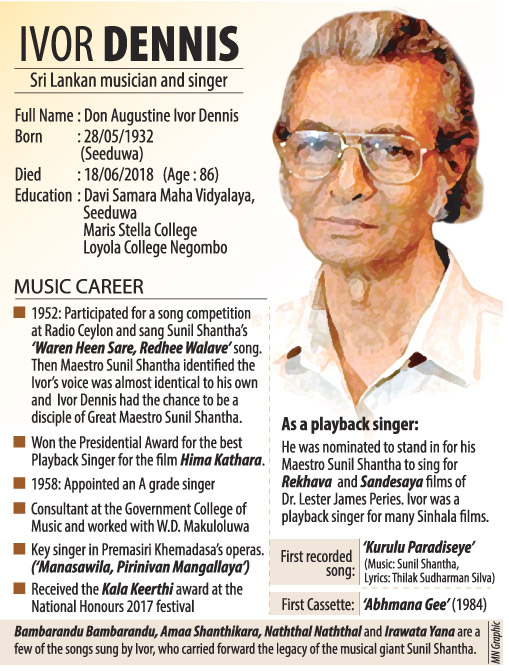
Sunil Shantha made a deep impression in young Ivor’s mind. Ivor idolized Sunil Shantha and to meet him face to face alone was enough for him, leave alone working with the legend. Yet, that is what life had in store for Pasquel Ge Don Augustine Ivor Dennis. Music was his life – and would remain so for more than six decades.
One fine day in 1952, music maestro Sunil Shantha was listening to Radio Ceylon (as the SLBC was then known) while relaxing at home, when he heard the faint strains of his popular song “Waren Heen Sare, Redhee Walave”. His initial reaction was probably “they are playing my song again” but then he listened closely for a couple of minutes. The voice was his – but not entirely his. Shantha realised that someone else was singing his song with equal finesse.
The very next day, Shantha visited Radio Ceylon and made inquiries as to who the melodious singer was. “Ivor Dennis” – the programme officer told him. “Ivor Dennis ? get him down for me” was his reply. That was the beginning of one of the greatest collaborative friendships in the local music industry. Together and separately, they gave a new identity to the Sinhala music industry which more or less copied the North Indian music scene at that time without any indigenous inputs.
Sunil Shantha made a deep impression in young Ivor’s mind. Ivor idolised Sunil Shantha and to meet him face to face alone was enough for him, leave alone working with the legend. Yet, that is what life had in store for Pasquel Ge Don Augustine Ivor Dennis. Music was his life – and would remain so for more than six decades.
 Unlike certain artistes today, Sunil Shantha had no qualms about Ivor performing his songs. In any case, there was no commercial gain for Ivor. But Sunil Shantha did not want Ivor to become a “cover” artiste singing someone else’s songs. He urged Ivor to carve his own niche – and he did. Ivor’s first own song was the evergreen hit ‘Kurulu Paradiseye’ (Bird Paradise) set of course, to the music of Sunil Shantha himself. The lyrics were penned by Thilak Sudharman Silva.
Unlike certain artistes today, Sunil Shantha had no qualms about Ivor performing his songs. In any case, there was no commercial gain for Ivor. But Sunil Shantha did not want Ivor to become a “cover” artiste singing someone else’s songs. He urged Ivor to carve his own niche – and he did. Ivor’s first own song was the evergreen hit ‘Kurulu Paradiseye’ (Bird Paradise) set of course, to the music of Sunil Shantha himself. The lyrics were penned by Thilak Sudharman Silva.
To date, the songs he performed decades ago including Bambarandu Bambarandu, Amaa Shanthikara, Naththal Naththal and Irawata Yana are perennially popular. Ivor had another talent up his sleeve – he could compose mesmerising, haunting music to go with his creations and those of others.
Over his lifetime, Ivor forged close links with legends such as Amaradeva, Victor Ratnayake, Sanath Nandasiri, Milton Perera and Narada Disasekara. Ivor participated in concerts in many countries including Japan, Indonesia, Italy, England and New Zealand.
Ivor was educated at Davi Samara, Seeduwa, Maris Stella College, and Loyola College Negombo. Ivor was appointed an A grade singer in 1958, exactly 60 years ago, at Radio Ceylon.
He won the Presidential Award for the best Playback Singer for the film ‘Hima Kathara’. He also received the Kala Keerthi award at the National Honours 2017 festival.
Ivor’s big break came in 1955 when the late Lester James Peries was making Rekhawa (The Line of Destiny) which forever changed the Sinhala cinema with its totally local storyline and outdoor photography. But the film has become even more memorable due to the inclusion of several catchy songs which were completely original and totally Sri Lankan. Lester had only one person in mind for the music – Sunil Shantha. Shantha in turn had only one person in mind for making everything possible – Ivor Dennis.
While Sunil Shantha composed the tunes for all songs, he could not travel to India for the recordings, so he nominated Ivor to stand in for him. Ivor also worked closely with the other playback artistes in the film, because it was a totally new experience for them. The process was repeated for Sandeshaya, Lester’s second film. Ivor went to record songs for many films.
Ivor could sing any type of song – but today, he is better known for his patriotic songs. In fact, he did an album of patriotic songs called ‘Abhimana Gee’ which was released in1984.
As a consultant at the Government College of Music, he promoted folk music and worked with the great W D Makuloluwa in ‘Depano and Pahanin Pahana’.
Apart from Sunil Shantha, Ivor worked closely with the inimitable Premasiri Khemadasa, especially, for operas, including, ‘Manasawila’ and ‘Pirinivan Mangallaya’. Ivor, though a Catholic, found bliss in Ven. Rambukana Sidhdhartha Thera’s profoundly meaningful, Buddhist-inspired lyrics in albums such as, ‘Sansare Api and Gammane Api’ .
Of course,Ivor sang Catholic devotional songs along with Sunil Shantha, whose uncle Rev. Fr. Moses Perera was a leading lyricist of Christian songs in Sinhala.
He produced two Catholic devotional albums ‘Ape pavulen oba mahimaya’ and ‘Obe wethi Rajindo’, where all the tunes were composed by him. Later, he received an OCIC award for the services rendered to Christian Music in Sri Lanka.
Ivor Dennis was a legend in his own lifetime. Although he will forever be associated with the maestro Sunil Shantha, Ivor had a unique voice which resonated with the music-loving masses and which will waft over the airwaves in Sri Lanka for hundreds more years.
